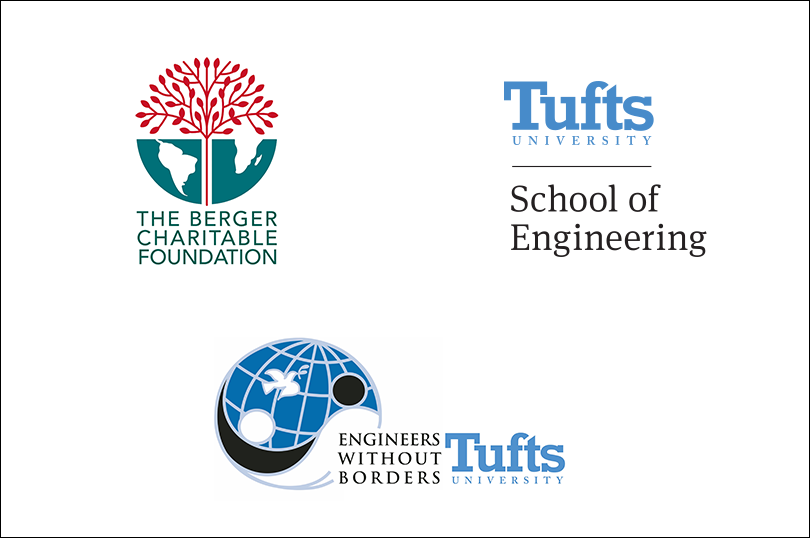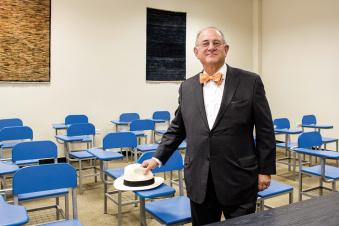Serving the needs of others

In the spring of 2020, the Tufts student chapter of Engineers Without Borders (EWB) and residents of the village of Silvio Mayorga, Nicaragua reached an exciting milestone: the completion of a new water tower for this small community west of Managua.
The tower is the result of a four-year collaboration between Tufts EWB, local community members, EWB USA and its Nicaragua office, and generous donors like the Berger Charitable Foundation. The project has helped the Tufts EWB students gain valuable technical skills, plus capabilities like project management, delegation, and sustaining a project through unexpected changes.
This year, the team was led by mechanical engineering major Shruti Krishnamachari, E22, and environmental engineering major Sophie Impellitteri, E22. The two joined the project as first-year students, when the assessment phase was underway. In 2017, a Tufts team (including Shruti’s brother, Vikram Krishnamachari, E19) traveled to Silvio Mayorga, where they met with community members and got a first-hand look at the water tower.
“Because the tower was rusting, it kept puncturing the plastic water tank,” said Impellitteri. “The community had attempted to patch the tank, but had used unsafe materials that had contaminated the water. Additionally, the tower was clearly settling and buckling, and it was simply too small to serve the water needs of the community.”
After assessment, they began alternatives analysis to determine the best path forward. Their options, said Krishnamachari, were, “to patch up the existing water tower, demolish the existing tower and create a new one at the same spot, or leave the old tower in place and build a new tower right next to it that could connect to the community’s existing water distribution system.”
The team chose the third option, but new challenges emerged: civil unrest in Nicaragua prevented additional site visits so the team switched to working remotely. This meant coordinating with partners with crucial expertise, including a Nicaraguan engineer with knowledge of local construction codes and the in-country and international offices of EWB.
Tufts professors and graduate students provided guidance on critical topics like soil mechanics, concrete design, and 3D modeling. Silvio Mayorga community members were involved at every step, from assessment and planning to welding and foundation digging. “It was their tower, and we want them to feel as much ownership of it as possible,” said Krishnamachari.
To retain their funding through EWB USA, the team needed to complete construction by March 2020—a reasonable goal, until COVID-19 unfolded. With 2020 travel canceled, the team faced steep new hurdles, including finding a new contractor to oversee implementation.
Just when the project seemed to be out of options, a generous gift from the Berger Charitable Foundation enabled the team to complete the water tower on deadline.
Robert Nardi, director of the Berger Charitable Foundation and senior partner at the Louis Berger Group, noted that the project was an excellent match for the Foundation’s interests in community development, and education. “When this funding opportunity came along, it fit the kinds of things we’re doing perfectly.”
“We are simply thrilled at the results of our contribution,” said Betty Berger, J69, a Berger Charitable Foundation board member. The Foundation stems from the Louis Berger Group, an engineering firm established by her father-in-law, Louis Berger E36, H65, A69P, and by her late husband, Fred Berger, A69.
“This is exactly the kind of project I know Fred and Lou would have been proud to support,” she said.
Today, Impellitteri and Krishnamachari are leading the final phase of monitoring, which includes writing an operating manual. The future holds the possibility of visits to assess the tower, and the community’s satisfaction, in person.
“Success is a sustainable, long term solution that provides adequate clean water to the community, and that the community is equipped to maintain and use for many years,” said Impellitteri. “I am very proud that we were able to complete a remote implementation during this pandemic.”
Krishnamachari pointed to the formative nature of struggling with and solving a real-world engineering problem. The students will always be proud of creating a sustainable source of clean water for Silvio Mayorga, she said.
Department:
Civil and Environmental Engineering
